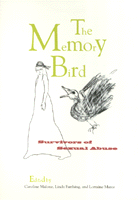Facing Abuse
April 26, 2009
http://eft.fabglitter.org/blog/?p=221
The Memory Bird:
Survivors of Sexual Abuse
Edited by Caroline Malone, Linda Farthing, & Lorraine Marce
Temple University Press, 1997
Like Dangerous Families, The Memory Bird is an amazing anthology of writing by abuse survivors, free from intervention or direction by psychological "experts."
 |
Its rareness (at least to me) comes not only in presenting the voices of sexual abuse survivors, but in the particular community involved: survivors of all sorts from New Zealand, Australia, and the United Kingdom.
The authors range from utterly unknown to nearly famous activists, pouring their hearts out sometimes for the first time; and the anthology's editors are no slackers themselves.
Who Are These People?
Caroline Malone is an artist and an activist for survivors' rights and needs. She is involved with - in fact, she's the founder of - a successful self-help network for sexual abuse survivors which began in 1989.
Lorraine Marce educates people on the psychological effects of sexual abuse and the rights of children, via workshops, lectures, and political lobbying.
Linda Farthing is a therapist with seventeen years of experience in working with sexual abuse survivors of all ages, and manages her own family therapy center.
With such a political group, it may be no surprise that this book stands out in one other important way: its political awareness. The art, stories, letters, poems, and essays within its covers run the emotional gamut, but unlike many books about abuse, this one has a special place in its heart for rage.
Shouting Out, Not Speaking Out
The Memory Bird is divided into different sections with names like "Claiming the Right to Feel Pain" and "Learning To Dance." Each section illustrates vividly the struggle to break the rule of silence and shame and speak out, as well as the beauty and strength of each person's recovery. But my favorite section by far was the last: "You Want a Witness?"
They end the book with a bang. One review of the book remarks that this section is about recovered memories and "helpful comments on false memory syndrome." This is what we call exceedingly subtle sarcasm.
This section is beautiful. The whole book is beautiful, in the particular way that truth is beauty and people sharing their truth is beautiful and the feelings and the strength andů. But you know, in this last section there is some TRUTH. Ass-stomping, how-dare-you, get-your-fucking-ass- out-here-motherfucker kind of truth, in which everyone who ever said "You know, that incest happened a long time ago, you need to just forget it and get on with your life," or "Well, you know, kids can really be very flirtatious, andů." or "Well, at least you're experienced," is utterly called on their shit.
It's a wonderful little book, full of good writing and especially of people being very open about a subject which has for so long been hermetically sealed. I think in many ways the angry parts make it easier to read, because anger is easier on many people than grief. This is the sort of book which inspires plenty of emotion.
Any original material on these pages is copyright © BishopAccountability.org 2004. Reproduce freely with attribution.